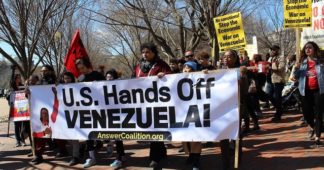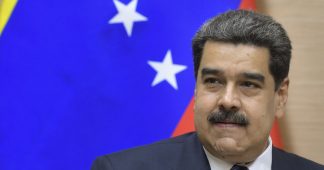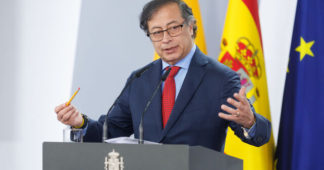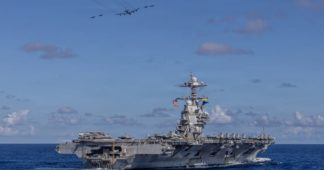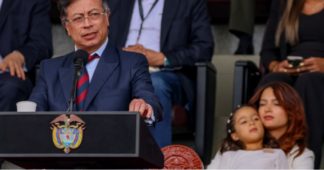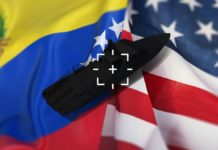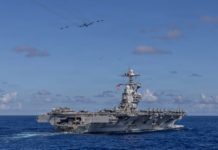By Yiannis Rachiotis,
Two months ago, the United States claimed that Venezuela is responsible for trafficking the narcotics entering the U.S., alleging the existence of a drug cartel … headed by the country’s elected president. Washington further asserted that drug trafficking constitutes a threat to U.S. national security and would therefore be confronted through military—not police—means. Subsequently, the U.S. deployed a large fleet to the Caribbean, including a nuclear-powered submarine armed with nuclear weapons and an aircraft carrier carrying dozens of fighter jets and thousands of Marines. They reactivated abandoned military bases on Caribbean islands and transferred substantial numbers of military aircraft and troops to various client island states.
They then began sinking small, unarmed vessels sailing in the Caribbean—using missiles, without any warning or maritime interdiction—killing their crews. Some 80 people of various nationalities have been killed this way. The pretext is that these boats were transporting narcotics—though the U.S. made no effort to verify the claim or collect evidence even post facto. Indeed, Washington has gone so far as to publicize video footage of some of the attacks, showcasing the arbitrariness of its actions. For years, the U.S. threatened Venezuela with invasion, bombing, and commando operations aimed at assassinating government officials. In recent days, however, American officials have begun speaking of dialogue—even at the highest level—without withdrawing their forces, and without giving any assurance that these statements are not merely deceptive gestures of reassurance. The bitter experience of Iran, which faced a U.S.–Israeli attack between two rounds of negotiations, is still fresh.
U.S. allegations that a hostile government—or even its head of state—participates in narcotics trafficking are nothing new. In Syria, until jihadist groups seized power in parts of the country, Washington accused President Assad of trafficking the drug Captagon and even passed an additional sanctions package titled the “Captagon Act.” As soon as Western-backed militias took control of territory, the accusations stopped and the sanctions were lifted. China is accused of illegally shipping the opioid Fentanyl to the U.S. Successive governments of Mexico are accused of facilitating drug trafficking, with Washington demanding the deployment of U.S. forces on Mexican soil. In the past, the U.S. invaded Panama and abducted its president—again under the pretext of drug trafficking to the United States.
The U.S. is indeed the country with the highest levels of drug production, trafficking, and consumption in the world. It is also virtually the only place where the profits from the drug trade are laundered. Yet for many years the U.S. has not arrested a single major trafficker on its own soil, nor dismantled a single money-laundering network. It is therefore clear that the massive military buildup off Venezuela’s coast has nothing to do with combating narcotics. Aircraft carriers and nuclear submarines are hardly the appropriate tools for policing operations.
For the past 25 years, the U.S. has been hostile toward every Venezuelan government. It organized at least one coup attempt against President Chávez, a drone assassination attempt against President Maduro, and a landing of American mercenaries seeking to overthrow the government. It recognized Juan Guaidó—who proclaimed himself “interim president” in a Caracas square—as the legitimate president of Venezuela, pressuring its allies to recognize him as well. Greece’s government never revoked this recognition. Exploiting its still-considerable control over the world’s major economic, commercial, and financial mechanisms, Washington imposed a sweeping blockade that excluded Venezuela from global transactions, driving the country into severe recession. In 2018, the United Kingdom seized Venezuela’s gold reserves worth roughly US$1 billion, stored at the Bank of England. Since 2019, the U.S. has occupied the Venezuelan Embassy in Washington and the refinery of the state oil company in Houston, Texas—under the vague pretext that the Venezuelan government was “corrupted.”
Venezuela managed to overcome the economic strangulation and stabilize its economy—with decisive support from China, Iran, and Turkey. The motives behind U.S. hostility are twofold: first, Washington’s imperial mindset, which cannot tolerate genuinely independent states; and second, the strategic importance of controlling Venezuela’s immense oil reserves—the largest proven deposits in the world—crucial for shaping the global economy.
Since its independence, Venezuela has never engaged in war, never threatened war, and poses no threat to any other state. Thus, no military action against it can be justified under Article 51 of the UN Charter, which recognizes only the inherent right of self-defense. International law provides no “right to wage war” for any state—however powerful—outside the context of self-defence, and even then, only until the Security Council takes charge. Any unilateral military action is unlawful. The same applies to unilateral coercive measures (UCMs)—misleadingly termed “sanctions” in Western propaganda to evoke notions of “punishment” for some “offence.”
In the cases of Venezuela—as well as Cuba, Iran, Syria, and others—UCMs have produced such extensive economic blockades that they caused hunger, the collapse of vital infrastructure, and deaths from curable diseases. These measures were accompanied by widespread sabotage, particularly against public-utility networks. All such actions constitute crimes against humanity.
In recent years, at the initiative of major European powers influencing the International Criminal Court (ICC), the Court’s Statute was amended to include the “crime of aggression.” Among other things, this crime encompasses the planning of an attack and the imposition of even a partial naval blockade—precisely what is happening today in the Caribbean. The ICC Statute is not a UN treaty, and thus applies only in states that have ratified it. The U.S. has not—but Venezuela has—meaning the ICC has jurisdiction over the international crimes described above. Nevertheless, the Court appears oblivious to these acts. Instead, it is investigating the Venezuelan government for “crimes against humanity” in connection with unrest provoked by the pro-U.S. opposition after its electoral defeats.
Under the Treaty of Tlatelolco—ratified by all Caribbean and Latin American countries except Argentina— even the mere presence of nuclear weapons in the Caribbean is prohibited. The U.S. has signed the treaty’s additional protocols banning the use or threat of use of nuclear weapons. The deployment of nuclear-armed vessels to the Caribbean—for the first time in history—is therefore a flagrant breach of U.S. obligations under these protocols.
The U.S. is fully aware that its conduct lies outside the framework of international law and its own treaty commitments. Above all, it knows it is violating the fundamental principles of the UN Charter: sovereign equality of states, respect for sovereignty and non-intervention, the preservation of international peace, and the obligation to follow the Charter’s procedures in resolving disputes. But adherence to the Charter no longer interests Washington. It treats the Charter as an obsolete constraint—a relic from the era before it established its global hegemony, when it still had to recognize the rights of others. In recent years, the U.S. has largely ceased referring to international law or the UN Charter, speaking instead of an amorphous “rules-based international order,” without specifying what those rules are or who sets them—implicitly reserving that authority for itself on a case-by-case basis.
By contrast, for the Global South—politically including Eastern European states—the defence of the UN Charter is a paramount priority. Not because they can enforce it, but because it embodies the core of institutionalized international law, guaranteeing a minimum framework for peaceful coexistence, despite its gaps and outdated provisions. Venezuela has long led an important international initiative to defend the UN Charter, supported by major countries of the Global South. Recently, on 13–14 November, and despite active threats of war, it hosted in Caracas a global conference on the defense of international law, attended by jurists from dozens of countries, predominantly from the Global South. This global gathering demonstrated the emergence of a broad coalition of states and movements that view the principles of international law—as articulated in the UN Charter—not as dead letters but as the foundation for joint action. Their objective is to impose respect for these principles on the world’s dominant powers, in order to safeguard their independence and resist neo-colonial projects.
We remind our readers that publication of articles on our site does not mean that we agree with what is written. Our policy is to publish anything which we consider of interest, so as to assist our readers in forming their opinions. Sometimes we even publish articles with which we totally disagree, since we believe it is important for our readers to be informed on as wide a spectrum of views as possible.
